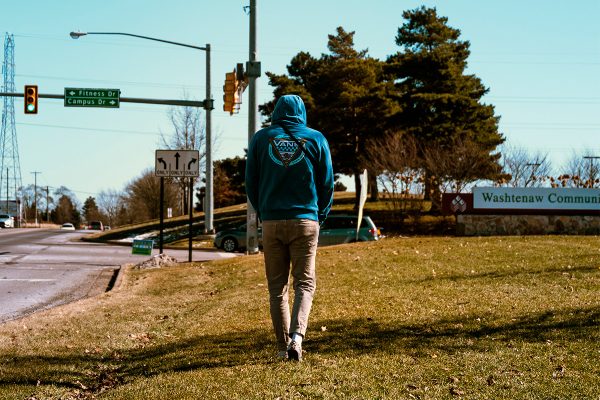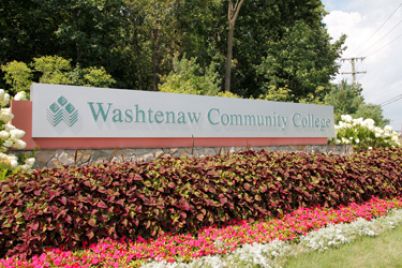
Connor Carlson, a student at WCC, walking down Huron River Drive towards WCC’s main entrance. Torrence Williams | Washtenaw Voice
By Brian Babcock
Staff Writer
In May 2017, WCC received a grant from the Transportation Alternative Plan through the Southeast Michigan Council of Government—now, three years later, the project will finally break ground come mid-March, and should be completed by Fall 2020.
The pathway was designed to stretch from Clark Road up along Huron River Drive to the college’s main entrance. The plan is to provide a pathway that will be non-motorized and provide a safe travel route for bikers and people who commute on foot along the Border-to-Border trail.
Charles Smith III works full-time as the director of Design and Construction Services at the college. According to Smith, a multitude of factors have played into the delayed construction of the pathway, but the main reason lies in how many parties have been involved in the process.
“This is a special case because it was a grant awarded to the college, which was designed to fill in a segment of the Border-to-Border trail. It’s facilitated the Michigan Department of Transportation with the Washtenaw County Road Commission working as the liaison,” Smith said.
The college has had to jump through a few hurdles to facilitate the project, with the Washtenaw County Road Commission taking on a good portion of the duties.
“They will be managing the project . . . they assisted us with all of the bidding, and it’s all based on MDOT requirements, so we had to bid it out exactly how MDOT bids out all of its other projects across the state,” Smith said.
A designer was hired to design the pathway out and then those construction documents were sent out for bid. Then, through the MDOT bidding process, contractors price it out in a competitive market.
The contractor who ended up winning the $453,470 bid was Eerie Construction. Smith also points to the current pricing of construction as a reason for a possible delay in the path being constructed due to higher prices.
“With the current construction climate, the bids came back higher so we had to partner with Southeast Michigan Council of Governments to basically cover the overages. So, the grant was tapped out at $291,000 for construction and then the contract was awarded at $389,000 so that overage… [The Southeast Michigan Council] is picking up 80% and we’re picking up 20%,” Smith said.
Additionally, the college had to cooperate with the Washtenaw County Parks and Recreation to grant an easement for the path.
“An easement is a legal document that allows something else to come through or take place on someone else’s property . . . this path, because of the grant stipulations, it required an easement along our property,” said Smith.
Vince Ranger oversees projects like this one for MDOT grants in Michigan’s metro region. Working as a grant coordinator for MDOT’s Office of Economic Development, Ranger says that there are many hoops projects like this have to jump through in order to be completed properly.
“Having so many parties involved could be part of it [the delay], but who’s property it is going on also plays a big part . . . this happens quite a bit with projects with this program,” said Ranger.
Currently the project is expected to break ground, weather depending, on March 23. Eerie Construction is contracted to complete the project by the end of July.


